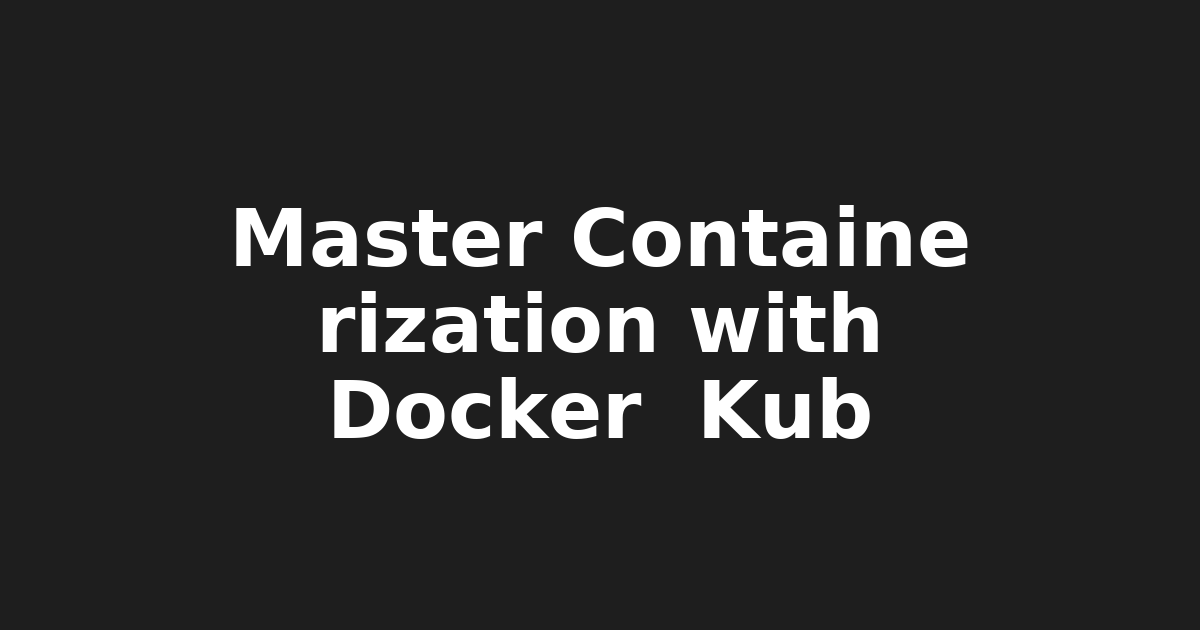Master Containerization with Docker & Kubernetes: Boost Your Self-Hosting…

Dive into the Future of Self-Hosting: Mastering Containers with Docker and Kubernetes! 🐳📦
Hey there, Tech Enthusiasts! 🚀
It's your favorite Linux educator, Josh from KeepItTechie, back to guide you through the hottest trend in Self-Hosting—Containers! Docker and Kubernetes are the names on everyone's lips, especially among developers, Linux users, system administrators, and IT pros like us.
Why all the fuss? Well, containers let us package our apps with every dependency they need to run consistently across different environments—no more "It works on my machine!" headaches! And when it comes to managing these containerized applications, Kubernetes reigns supreme for its powerful features like auto-scaling, self-healing, and rolling updates.
Pro Tip: If you're looking to stand out in the job market, add "Docker," "Kubernetes," and "CI/CD" to your skillset! 🌟
If you're curious about creating Docker images, managing containerized applications using Kubernetes, or implementing CI/CD pipelines with tools like Jenkins or GitLab Runner—you've come to the right place! Let me walk you through this journey step by step.
First things first: Creating your very own Docker image 🎨 involves defining an application and its dependencies in a Dockerfile. Don't worry, it's less daunting than it sounds! Once you get the hang of it, you'll be creating images like a pro.
Next up: Managing containerized applications using Kubernetes 🌐—this is where the real magic happens! Imagine deploying, scaling, and managing your apps with just a few commands. Sounds too good to be true? Give it a try, and you'll see for yourself!
But wait, there's more! To truly optimize your Self-Hosting infrastructure, you'll want to set up CI/CD pipelines using tools like Jenkins or GitLab Runner. This allows for seamless integration of your code from development to production—who doesn't love a smooth workflow?
Now, let's talk about the buzz in online communities. What are the best practices for self-hosting containers? How do we secure our containerized environments? And how can we optimize performance? Fear not! Resources like Reddit's r/docker, r/kubernetes, and the Linux Foundation's open source community are teeming with knowledge and friendly folks ready to help.
Pro Tip: Join these communities for ongoing support, updates, and valuable insights from experts in the field! 💡
As we venture further into the world of containers, remember: it's all about finding the right balance between innovation and practicality. Don't be afraid to experiment—that's how progress is made!
Stay tuned for more on self-hosting containers, as I delve deeper into securing containerized environments and optimizing performance. In the meantime, happy containerizing! 🎊🎉
Until next time, keep it techie!
—Josh
SEO Keywords: Containers, Docker, Kubernetes, Self-Hosting, CI/CD, Jenkins, GitLab Runner, Linux, system administration, IT professionals, online communities, Reddit, r/docker, r/kubernetes, Linux Foundation.
Sources and Further Reading:
- Docker: Getting Started
- Kubernetes: Getting Started
- Jenkins: Getting Started
- GitLab Runner: Getting Started
- Linux Foundation Community
🙋♂️ This post was brought to you by Josh from KeepItTechie — helping you break into tech, one command at a time.
